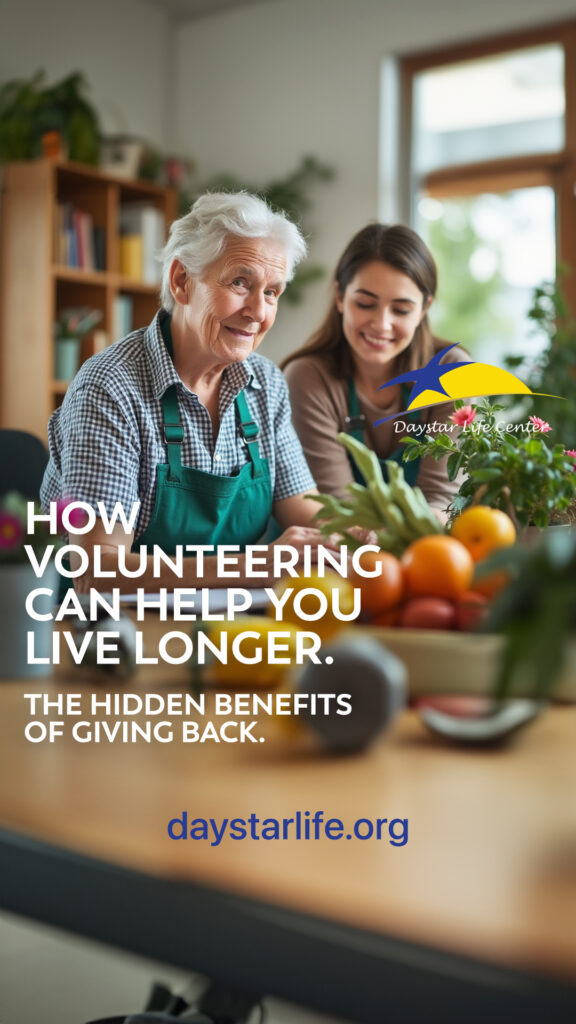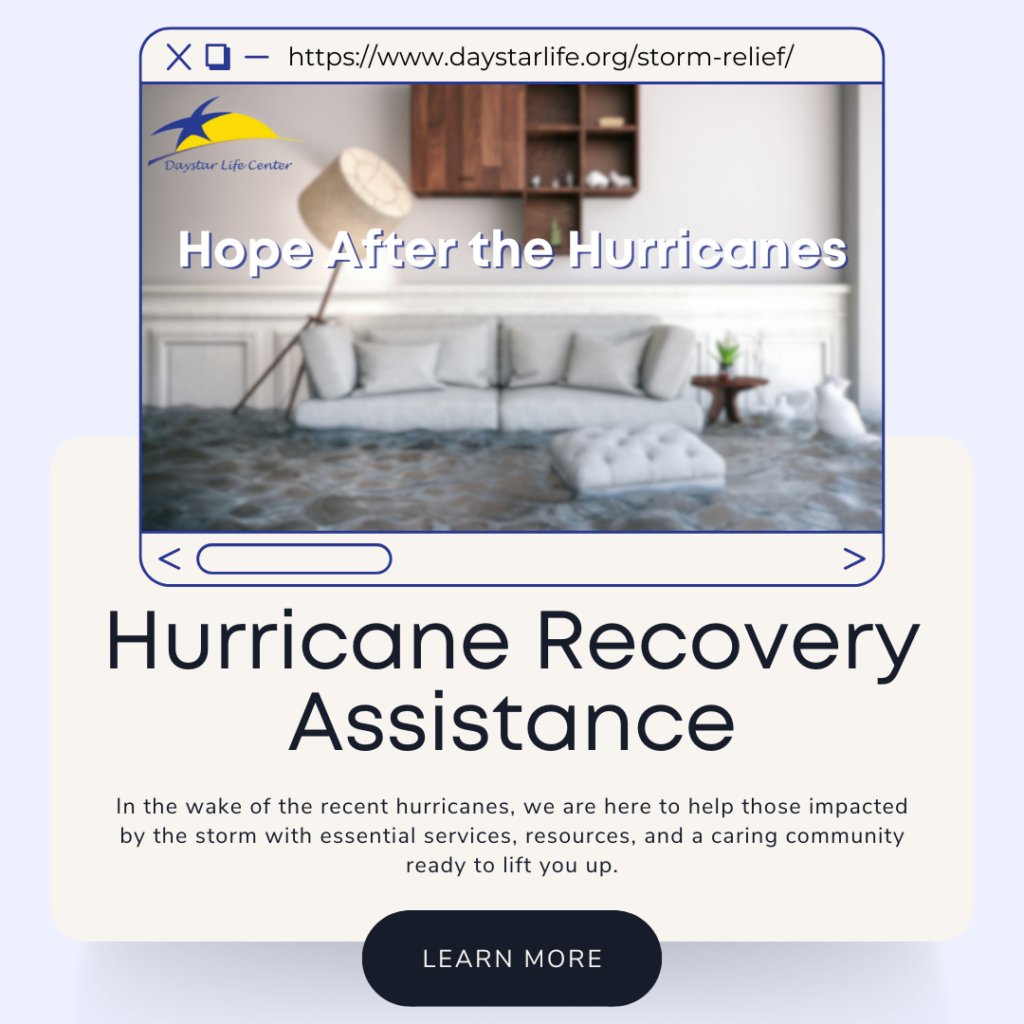In a world where the pace of life often seems relentless and everyday pressures weigh heavily on us, the concept of giving back might seem like a luxury rather than a practical necessity. However, growing evidence suggests that volunteering at nonprofit organizations like Daystar Life Center not only enriches the lives of others, but can also significantly enhance your own longevity and well-being. There are many compelling reasons why engaging in volunteer work might be a key to a longer, healthier life.
The Connection Between Volunteering and Longevity
Recent studies have illuminated a fascinating link between volunteering and increased lifespan. While it might initially seem counterintuitive that dedicating time to others could directly impact your own life expectancy, research shows that the benefits of volunteering extend far beyond the immediate rewards of making a difference.
Reducing Stress and Enhancing Happiness
One of the most profound ways volunteering impacts longevity is through its psychological benefits. Engaging in meaningful work helps to reduce stress, anxiety, and depression, which are all known to negatively impact health and longevity. When you volunteer, you often experience a sense of purpose and accomplishment, which boosts overall happiness and reduces feelings of isolation.
A Journal of the American Medical Association study found that older adults who volunteered regularly had a lower risk of depression and a greater sense of life satisfaction. The sense of community and belonging that volunteering fosters can counteract the effects of social isolation—a significant risk factor for poor health outcomes.
Moreover, the act of giving back can trigger the release of endorphins, often referred to as “feel-good” hormones, which are well-known for enhancing your mood, but also reduce pain and promote a sense of well-being. This emotional boost can contribute to lower levels of cortisol, a hormone associated with stress, thereby improving overall health and potentially extending lifespan.
Keeping Active and Engaged
Volunteering often involves physical activity, whether it’s helping with community projects, assisting in physical tasks, or participating in events. This increased physical activity is beneficial for maintaining cardiovascular health, muscle strength, and flexibility, all of which are crucial for longevity.
Older adults who volunteered had lower mortality rates compared to those who did not. The researchers attributed this finding to the increased physical activity that often accompanies volunteer work, as well as the psychological benefits of staying active and engaged.
Additionally, volunteering can encourage healthier lifestyle choices. Many volunteer roles involve promoting wellness in others, which can, in turn, motivate volunteers to adopt healthier habits themselves, such as better nutrition, regular exercise, and routine health check-ups.

Building a Support Network
Social connections are vital for both mental and physical health. Volunteering provides opportunities to meet new people and build strong, supportive relationships. These social connections can provide emotional support, reduce feelings of loneliness, and create a sense of community. Strong social networks are linked to lower mortality rates. Volunteers often develop lasting friendships and networks through their service, which can provide crucial support in times of need and enhance overall quality of life.
Moreover, volunteering fosters a sense of belonging and purpose, which can be particularly valuable as people age. Maintaining strong social ties through volunteer activities can help prevent the feelings of isolation that can come with retirement or the loss of loved ones, thereby contributing to a longer, healthier life.
Volunteering as a Catalyst for Healthy Aging
Mental stimulation is another key factor in healthy aging. Volunteering often involves problem-solving, learning new skills, and engaging with diverse groups of people, all of which can keep your mind sharp and engaged. Engaging in such cognitive activities reduces the risk of cognitive decline and dementia. Older adults who volunteer regularly have better cognitive function compared to their non-volunteering peers. The mental challenges and social interactions involved in volunteering appear to contribute to better cognitive health and a slower rate of cognitive decline.
Having a sense of purpose is critical for maintaining motivation and a positive outlook on life. Volunteering offers a clear sense of purpose by allowing individuals to contribute to causes they care about. This purpose can lead to a more fulfilling life and help people stay engaged with their communities -plus, individuals with a strong sense of purpose have a lower risk of mortality. The sense of accomplishment and meaning derived from helping others can boost overall mental health and resilience, contributing to a longer and healthier life.
Volunteering Reduces Health Risks
Engaging in volunteer work can also help reduce a variety of health risks. The physical activity involved in many volunteer roles can help control weight, lower blood pressure, and improve cardiovascular health. Furthermore, the social engagement associated with volunteering can mitigate stress.
For individuals with chronic health conditions, volunteering can offer therapeutic benefits. Volunteering is associated with better self-reported health and fewer limitations related to chronic conditions. The moderate physical exertion is beneficial for managing conditions such as diabetes, hypertension, and arthritis. Additionally, the emotional support and sense of achievement that come from volunteering can improve overall well-being and health management. The positive psychological effects of volunteering can complement medical treatments and improve quality of life for those managing chronic diseases.
Practical Tips for Incorporating Volunteering into Your Life
If you’re inspired to start volunteering and reap the benefits for your health and longevity, consider the following tips:
Choose a Cause You Care About
Find a cause or organization that aligns with your interests and values. Daystar Life Center fights hunger, poverty, and hopelessness by providing the necessities of life to our neighbors in need. They strive to engage, educate, and empower the community by promoting the value of nutrition, good health, and financial literacy. If you are passionate about that mission, your volunteer experience there will be enjoyable and fulfilling.
Start Small
Begin with a commitment that fits into your current schedule and gradually increase your involvement as you become more comfortable.
Explore Different Roles
Volunteering doesn’t have to be a one-size-fits-all experience. Explore various roles and activities to find what suits you best.
Stay Engaged
Look for opportunities that allow you to continue learning and growing. Engaging in diverse tasks and meeting new people can keep the experience fresh and stimulating.
Prioritize Balance
Ensure that volunteering complements rather than overwhelms your existing commitments. Balance is key to sustaining long-term involvement and enjoying the benefits.
Learn more about volunteering at Daystar by contacting ashley.bigby@daystarlife.com, or come to our next volunteer information session. Information sessions are held on the 1st Saturday and 3rd Monday of each month, excluding holidays, at 1:30pm.
Car Credit and Daystar Encourage Volunteering
Mounting evidence demonstrates that volunteering can be a powerful tool for enhancing longevity and overall well-being. By reducing stress, boosting happiness, encouraging physical activity, fostering social connections, and providing a sense of purpose, volunteering contributes to a healthier and potentially longer life.
Daystar Life Center is a Strategic Partner of Nuevo en US (www.nuevoenus.org), selected for a Spanish-language marketing program funded by Car Credit (www.carcredittampa.com). Steve Cuculich, owner of Car Credit believes deeply in the power of philanthropy and volunteerism. “The act of giving back offers more than just the satisfaction of helping others,” says Cuculich. “It actually provides benefits for our own health and longevity.” So, consider finding a cause you’re passionate about and start volunteering today. Your future self—and those you help along the way—will thank you for it.

